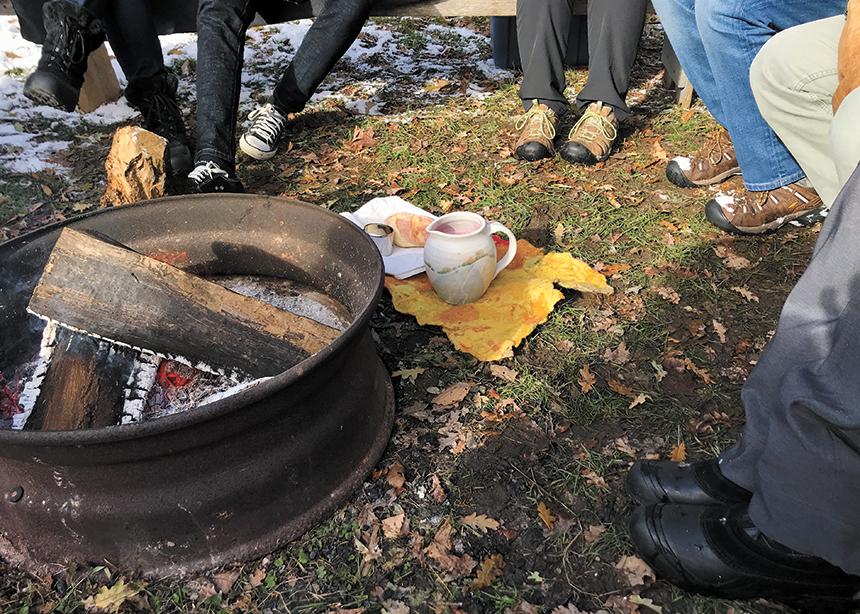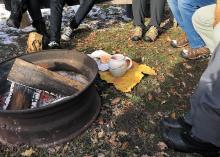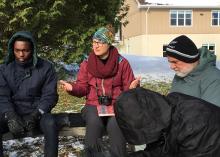Hopelessness. Denial. Grief. Guilt. Despair. Pastors face these emotions in their congregations as they walk with people suffering from personal losses.
Through a series of retreats funded by the Center for Sustainable Climate Solutions in Harrisonburg, Va., church leaders are beginning to transfer these skills to climate change. The non-profit and its partner, Mennonite Creation Care Network, see faith leaders as having a critical role to bring to the challenge.
Eighteen Mennonite pastors and leaders met at Hidden Acres Mennonite Camp in New Hamburg last November for the second of a number of planned “Who cares about climate change?” retreats. Doug Kaufman, who pastors at Benton Mennonite Church in Goshen, Ind., plans the events and is the primary presenter, but each one also draws on local leadership.
Denial and despair
Kaufman began the retreat by naming the forms of denial human beings use to avoid facing a threat like climate change: from literal denial of the facts, to acknowledging the facts but failing to act. All are attempts to avoid despair.
“My despair comes from doubting I can do anything effective,” said Michele Rizoli of Toronto United Mennonite Church.
“I haven’t had opportunities to talk about this with other pastors. It doesn’t come up at most pastoral meetings,” observed Glyn Jones of Wanner Mennonite in Cambridge.
“Climate change means poverty will continue,” observed Deus Okong’o, a volunteer with Mennonite Central Committee’s International Volunteer Exchange Program, who provided a Tanzanian perspective.
Worry for grandchildren and other youth topped the list of concerns.
From denial to lament
The retreat offered multiple pathways to help people claim their negative emotions and lament the losses they fear. With the help of Tamara Shantz, a spiritual director and a pastor for young adults with Pastors in Exile, the group reflected on an Ignatian model that acknowledges entering into brokenness as an important part of the spiritual life.
Wendy Janzen, who pastors at St. Jacobs Mennonite Church, led several outdoor worship services for retreatants, using the forest church model. Worship experiences included time for silence, solitude and lament, including lament for extinct species in Ontario or those threatened with extinction. (See “Meeting the Creator in creation.”)
Hope and action
Scott Morton Ninomiya, a doctoral student at the University of Waterloo, offered a session entitled “From energy audience to energy authors,” challenging the retreatants to think of themselves as having the agency to determine where energy comes from and providing stories of those who had done this. An entrepreneur who set up a solar farm in the Sahara Desert in 1913, a mother of five who founded Germany’s first green energy supplier, and an Indian woman whose efforts brought solar power to over a thousand villages, were among them.
Steve Dyck, president of Guelph Solar and an advocate for the Citizens Climate Lobby, explained how a carbon tax could rapidly curb emissions, provide stability for businesses and assist the poor.
Pastors spent an evening coaching each other as they planned actions they could take in their own congregations. Laura Enns of Waterloo-Kitchener United Mennonite Church imagined how she might link young adults and older adults in a conversation about climate change. Susan Allison-Jones of Wilmot Mennonite Church in New Hamburg talked of leading a Christian education class on climate change.
See also the book review: ‘Called to be a church for others.’





Comments
In the 70s I was at a camping convention in Ontario. One of the participants came to me and asked if I was a Christian. I said I am. He responded by saying he would never be a Christian because how Christians have treated the environment. He continued by stating that Christians claim to know and love the creator. They don’t show it. His words have been part of my theology ever since. It is long past due that we as Christians stand up and become leaders in protecting what we believe the God we worship made and said it was good. Thank you for this article and thank you too for those who were involved in organizing this event.
Ric Driediger, Churchill River Canoe Outfitters
Add new comment
Canadian Mennonite invites comments and encourages constructive discussion about our content. Actual full names (first and last) are required. Comments are moderated and may be edited. They will not appear online until approved and will be posted during business hours. Some comments may be reproduced in print.